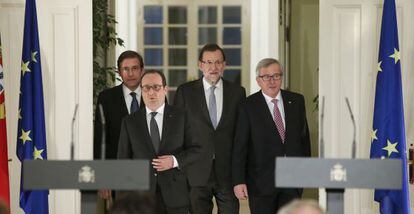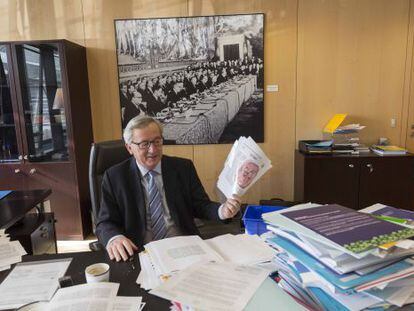EC chief: “Spain and Portugal have no diabolical plan against Greece”
Jean-Claude Juncker defends Iberian nations from Greek leader’s “axis of power” claims


The controversy over Greek bailout negotiations that has engulfed the governments of Greece, Spain and Portugal took center stage at an energy summit held Wednesday in Madrid.
Spanish Prime Minister Mariano Rajoy, his Portuguese counterpart Pedro Passos Coelho, French President François Hollande and European Commission President Jean-Claude Juncker all sought to play down the tension created last Saturday when Athens accused the conservative governments of both Iberian nations of seeking to “overthrow” the left-wing Syriza government.
“I have not observed, during the last two weeks, that Portugal and Spain have a diabolical plan to cause [Alexis] Tsipras’ government to fall,” said Juncker ironically. “If I had the impression that Mariano and Pedro harbored such detestable plans, I would have intervened, but it was not the case.”
Rajoy also tried to tone down the conflict, albeit stressing that he did not appreciate Tsipras’ statements regarding “an axis of powers led by Spain and Portugal” with the goal of torpedoing negotiations for an extension of the Greek bailout.
“There was an accusation I did not like about our wanting to change the Greek government, but we have to look to the future now,” said Rajoy.
“The key is for all of us to know how to remain civil and meet our commitments,” he added as a warning to Athens.
“We want to have the best possible relations with Greece. We want things to go very well for Greece. I wish the Greek people the same things as I wish the citizens of my own country,” concluded Rajoy.
The Portuguese leader, Pedro Passos Coelho, also spoke carefully, but noted that the “countries that are under financial assistance are those that requested it.” Portugal itself was bailed out in 2011 and exited the program three years later after complying with the conditions set by the Troika – the International Monetary Fund, the European Central Bank and the European Commission.
The key is for all of us to know how to remain civil and meet our commitments”
Spanish PM Mariano Rajoy
For French President Hollande, the important thing “was that there has been a change of tack in Europe in a good direction, with support for politics that will help growth.”
EC President Juncker was repeatedly asked about the recent interview he granted EL PAÍS, in which he said Spain could not yet declare the economic crisis over.
“I am not saying there is no recovery in Spain. The signs are evident: it is beginning to grow. But I do say that as long as Europe and Spain have such high unemployment rates, we cannot say that we have overcome the crisis.”
The agenda of the summit featured a plan to encourage energy interconnection between the represented countries. This includes renewing work on the Midcat project, a gas pipe that will connect Catalonia with southern France. The overarching goal was for “the Iberian peninsula to stop being an energetic island,” said Rajoy.
Europe is asking Spain and France to increase their regional cooperation to improve the peninsula’s electrical connections with the rest of the EU.











































